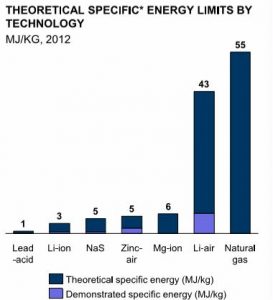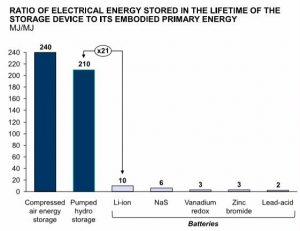
Preface: Right now, and as long as natural gas lasts, the electric grid will stay up since it is the main storage and way to balance unreliable wind and solar power. Hydropower can also play a major role in the 10 states that have 80% of it (Washington state 25% alone). California has gone further than any other state with the amount of renewable power generated yet still depends on natural gas a third to half the time because the southwest is in the worst drought in 1200 years since the year 2000, so hydropower no longer contributes as much electricity as it once did. Batteries don’t even remotely scale up and are terrifically expensive. Since lithium batteries can be explosive, zinc air batteries are being pursued as an alternative. Plus there’s more zinc in the world, though not much, Penn (2018) reports just 25 years of zinc reserves left and even less for lithium.
Batteries store a pitiful amount of energy compared to natural gas — a gas! — with 11 times more energy than a Zinc-air battery & 18 times more than lithium.

Specific energy is the amount of stored energy per mass unit (kilogram or liter). Source: Kurt Zenze House. 2009. The limits of energy storage technology.
These enormous expensive batteries need to be replaced every 15 years. If you look at the energy stored over the lifetime of a storage device, compared to the energy used to build it, compressed air energy storage and pumped hydro storage ate orders of magnitude cheaper and more effective than batteries, with zinc-bromide near the bottom:

This graph shows the ratio of electrical energy stored over the lifetime of a technology to the energy needed to build it. Stored energy over the lifetime depends significantly on the cycling life, the efficiency, and the depth of discharge. Source: Charles J. Barnhart (2013) On the importance of reducing the energetic and material demands of electrical energy storage.
The deployment challenges of zinc-air batteries also include poor reversibility and resultant cycling problems due to metal plating, as well as evaporation of the aqueous electrolyte when used in an open system (Parfomak 2012). There are many other issues, especially the need to scale up production from small button cells to shipping container-size systems while maintaining their performance (Cho 2021).
Zinc air batteries have been lauded for their potential cheap energy storage, much lower than lithium-ion, though experts cautioned that the actual cost varied a great deal depending on the application, making it hard to compare with lithium batteries.
Zinc is also much less toxic than lithium, or a fire hazard like lithium. Though it’s not completely safe — the ore is zinc sulfide and produced along with lead, cadmium, and nickel which can cause harm from sulfur dioxide and cadmium-vapors.
More importantly, Dr. Narayan, professor of chemistry at the University of Southern California, said reserves of lithium, a primary element in lithium-ion batteries, were only 5% of the reserves of zinc. But, he noted “At the present rate of production of zinc, zinc reserves will last about 25 years. So it is not clear from the reserves available if we will have enough zinc to support the enormous need that will result from the demand for grid-scale batteries.” (Penn 2018a).
Mr. Cooper, senior research fellow for economic analysis at the Institute for Energy and the Environment at the Vermont Law School pointed out that fracked gas has taken attention away from the need for alternative ways to store energy, since natural gas is the main way the intermittency, unreliability, and complete lack of wind and solar are coped with now. Cooper noted that capitalism doesn’t deal with problems where there isn’t scarcity, so money isn’t flowing into battery energy storage research and development (Penn 2018b).
References
Service RF (2021) Zinc aims to beat lithium batteries at storing energy. Science 372: 890-891.
Parfomak, P. W. 2012. Energy Storage for Power Grids and Electric Transportation: A Technology Assessment. Congressional Research Service.
Penn, I. 2018a. How zinc batteries could change energy storage. New York Times.
Penn, I. 2018b. Cheaper battery is unveiled as a step to a carbon-free grid. New York Times.
Alice Friedemann www.energyskeptic.com Author of Life After Fossil Fuels: A Reality Check on Alternative Energy; When Trucks Stop Running: Energy and the Future of Transportation”, Barriers to Making Algal Biofuels, & “Crunch! Whole Grain Artisan Chips and Crackers”. Women in ecology Podcasts: WGBH, Jore, Planet: Critical, Crazy Town, Collapse Chronicles, Derrick Jensen, Practical Prepping, Kunstler 253 &278, Peak Prosperity, Index of best energyskeptic posts
***

One Response to Can Zinc batteries save the electric grid?